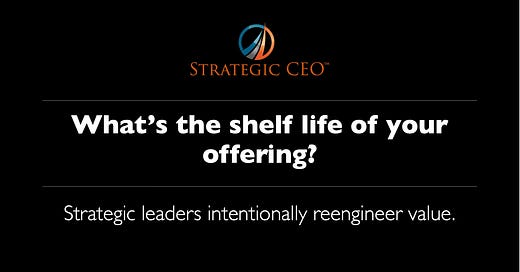THINK ON IT: What’s the shelf life of your offering?
Every offering — be it a product or service — has a shelf life. Some are short, like bananas, while other shelf lives are long, like bolts.
Left unattended, most things, including our most revered offerings, depreciate in value over time. Like our businesses, as I pointed out in a previous article, our offerings are also subject to the law of physics and diminishing returns.
It’s not that your offerings are physically perishable, like a banana; but that other forces are silently eroding their perceived value from all sides. Competitors create disruptive alternatives — or deliver similar offerings to your customers and prospects at a lower price. Your customer’s needs and priorities shift with the demands and aspirations of their business. And even the growing complexity and range of options available to buyers can create an erosion in the perceived value of your offering.
That’s why it’s so important to not just be different, but to be distinctive in your offering. But it’s hard to be objective about whether or not our offerings are truly distinctive. That’s because we’re all prone to a cognitive bias known as the “endowment effect.”
The endowment effect bias causes us to subconsciously overvalue the things we “own.” It explains why free trials and freemium offerings are so effective—once you have them, you’re less inclined to give them up. But it also explains why many investors don’t sell when they should, why parents think their baby is the cutest, and why entrepreneurs believe their product is the best.
Don’t settle with being satisfied in your own offering. Strategic leaders recognize they may have a soft blind spot when it comes to their products and services and intentionally lead their teams to reengineer the value they deliver.
[Premium members] Read on to learn three practices needed to intentionally reengineer value. (Become a Premium Member. Paid subscribers get access to nearly 100 tools and how-tos on implementing strategic topics, including a 7-part series to help leaders build their own strategic capacity.)
“Quality is never an accident. It is always the result of intelligent effort.”
— John Ruskin
Thanks for being a subscriber to Strategic CEO. If you enjoyed this post, please share it with a friend or colleague.
Keep reading with a 7-day free trial
Subscribe to Strategic CEO to keep reading this post and get 7 days of free access to the full post archives.



